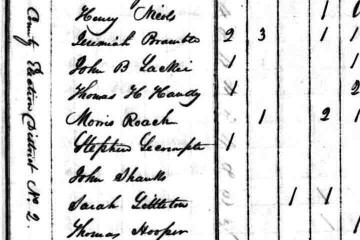East New Market
Census Records
Census Records
 East
New Market
East
New Market
Census for Revolutionary War debt1776
U.S. Census Schedules
1790, 1800, 1810, 1820, 1830, 1840, 1850, 1860, 1870, 1880, 1890, 1900, 1910, 1920, 1930, 1940
U.S. Census Slave Schedules
1850, 1860
U.S. Census Mortality Schedules
1850*, 1860, 1870, 1880
U.S. Census Social Statistics Dorchester County Population
1850, 1860, 1870, 1880 1790-1950
Census History
The first comprehensive account of households in North America occurred in 1624 when the King of England ordered Virginia's leaders to make a record of the colony's inhabitants and their provisions. The census-takers counted: 124 persons, twenty-two houses, threestores, and a church.
From 1624 to 1776 in certain jurisdictions lists that contain the names of landowners, and other taxable persons were created. For instance for most years from 1722 to 1759, Somerset County, Maryland constables created a list of free males over the age of fifteen and
slaves of both sexes over fifteen for tax purposes. In Northampton County, Virginia, these same types of lists are available for the years 1662 to 1677 and 1720 to 1769. Throughout Maryland including Dorchester County the tax list for 1783 contains type of housing, number of inhabitants, livestock, etc. See Tax Records. Tax records are typically not comprehensive accounts of all household members, thus are not considered true census records.
In Dorchester County, the first known full census was conducted in 1776. To pay for the Revolutionary War, Congress took measures to levy a tax on each colony according to population. Maryland was one of the colonies that took a census in 1776.
Following the Revolutionary War, there was an immediate need for a census of the entire Nation, both to apportion the number of seats in the U.S. House of Representatives and to further establish each states share in paying for the war. Article I, Section 2 of the U.S. Constitution, adopted in 1787, provided "The actual Enumeration shall be made within three years after the first Meeting of the Congress of the United States, and within every subsequent Term of ten Years…"
The first U.S. Census was conducted in 1790 and a census has been conducted every ten years thereafter. The early census acts established the questions to be asked, but uniformly printed schedules were not furnished until 1830. From the 1790 through the 1840 census, only the names of household heads with counts of other household members appeared on the schedules. Beginning in 1850, census-takers listed the name of every free person. In 1850, the U.S. Census also began collecting additional statistics, such as occupation, state of birth, value of real estate. etc. Later U.S. Census records added more items, such as relationships, data on home ownership, education, marriage, birthplace of parents, etc.
Copies of U.S. Census schedules from 1790 to 1940 area available for research at the National Archives and online sites such as Ancestry, the U.S. GenWeb Census Project, and FamilySearch. U.S. Census records are closed to the public for 72 years to protect the confidentiality of the information they contain. The 1950 Census will be made available for public research on April 1, 2022.